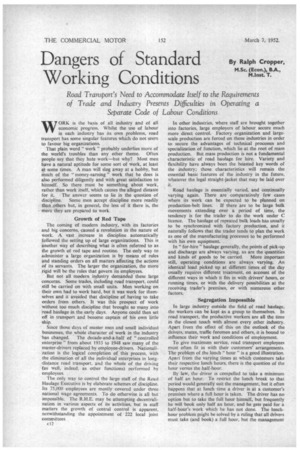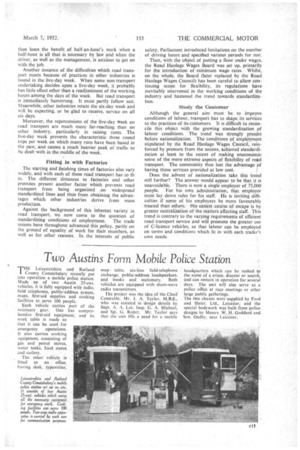Dangers of Standard Working Conditions
Page 50

Page 53

If you've noticed an error in this article please click here to report it so we can fix it.
By Ralph Cropper, M.Sc. (Econ.), B.A., M.Inst. T.
WORK is the basis of all industry and of all economic progress. Whilst the use of labour in each industry has its own problems, road transport has som.e singular features which do not seem
to favour big organizations. ..
That plain word" work" probably underlies More of the world's troubles than any other theme. Often people say that they hate work—but why?. Most men have a natural aptitude for some sort of work, at least at some times. A man will slog away. at a hobby, but much of the " money-earning " work that he does is also performed diligently and with great satisfaction to himself. So there must be something about work, rather than work itself, which causes the alleged distaste for it. 'The answer seems to lie in the question of discipline. Some men accept discipline more readily than .others but, in general, the less of it there is, the mare they are prepared to work, Growth of Red Tape
The coming of modern industry, with its factories and big concerns, caused a revolution in the nature of work. A vast increase in discipline automatically followed the setting up of large organizations. This is another way of describing what is often referred to as the growth of red tape and routine. The only way to administer a large organization is by means of rules and standing orders on all matters affecting the actions of its servants. The larger the organization, the more rigid will be the rules that govern its employees.
But not all modern industry demanded these large concerns. Some trades, including road transport, could still be carried on with small units. Men working on their own had to work bard, but it was work for themselves and it avoided that discipline of having to take orders from others. It was this prospect of work without too much discipline that brought so many into .• road haulage in the early days. Anyone could then set off in transport and become captain of his own tittle ship.
Since those days of master men and small individual businesses, the whole character of work in the industry has changed. The decade-and-a-half of "controlled enterprise" from about 1933 to 1948 saw many of the master-drivers replaced by employee-drivers. Nationalization is tile logical Completion of this process, with the elimination of all the individual enterprises in longdistance road transport, and the whole of the driving (as well, indeed, as other functions) performed 'by employees.
The only way to control the large staff of the Road Haulage Executive 'is. by elaborate schemes of discipline. Its 75,000 employees are mostly covered under three national wage agreements. To do otherwise is all but impossible. The R.H.E. may be attempting decentralization in various aspects of its activities, but in staff matters the growth of central control is apparent, notwithstanding the appointment of 222 local joint committees.
c12
In other industries, where staff are brought together into factories, large employers of labour. secure much more direct control. Factory organization and largescale production are forced on those industries in order to secure the advantages of technical processes and specialization of function, which he at the root of mass production. But mass production is not a fundamental characteristic of road haulage for hire. Variety and flexibility have always been the boasted key words of the industry; those characteristics will remain the essential basic features of the industry in the future, whatever the legal straight-jacket that may be laid over it.
Road haulage is essentially varied, and continually varying again. There are comparatively few cases where its work can be expected to. be planned on
production-belt lines. If there are to be large bulk movements extending over a period of time, the tendency is for the trader to do the work under C licence. The haulage of repeated bulk loads has usually to be synchronized with factory production, and it naturally follows that the trader tends to plan the work as one of the manufacturing processes to be performed with his own equipment.
In" for-hire" haulage generally, the points of pick-up and discharge are always varying, as are the quantities and kinds of goods to be carried. More important still, operating conditions are always varying. An identical load picked up at different times of the day usually requires different treatment, on account of the different ways in which it fits in with drivers' hours, or running times, or with the delivery possibilities at the receiving trader's premises, or with numerous other factors.
Segregation Impossible In large industry outside the field of road haulage, the workers can be kept as a group to themselves. In road transport, the productive workers are all the time in the closest touch with almost every other industry. Apart from the effect of this on the outlook of the drivers,mates, traffic foremen and others, it is bound to influence their work and conditions of employment.
To give maximum service, road transport employees must often fit in with their customers' arrangements. The problem of the lunch " hour " is a good illustration. Apart' from the varying times at which customers take their respective lunch hours, there is the question of the hour versus the half-hour, By -law, the driver is compelled to take a minimum of half an hour. To restrict the lunch break to that period would generally suit the management, but it often happens that at lunch time a driver is at a customer's premises where a full hour is taken. The driver has no option but to take the full hour himself, but frequently he will book only half an hour, and he gets paid for a half-hour's work which he has not done. The lunchhour problem might be solved by a ruling that all drivers must take (and book) a full hour, but the management then loses the benefit of half-an-hour's work when a half-hour is all that is necessary by law and when the driver, as well as the management, is anxious to get on with the job.
Another instance of the difficulties which road transport meets because of practices in other industries is found in the five-day week. When some non-transport undertaking decides upon a five-day week, it probably has little effect other than a readjustment of the working hours among the days of the week. But road transport is immediately hamstrung. It must partly follow suit. Meanwhile, other industries retain the six-day week and will be expecting, or be glad to receive, service on all six days.
Moreover, the repercussions of the five-day tveek on road transport are much more far-reaching than on other industry, particularly in raising costs. The five-day week prevents the characteristic three round trips per week on which many runs have been based in the past, and causes a much heavier peak of traffic to be dealt with in the middle of the week.
Fitting in with Factories
The starting and finishing times of factories also vary widely, and with each of these road transport has to fit in. The different distances to factories and other premises present another factor which prevents road transport from being organized . on widespread standardized lines and thus from obtaining the advantages which other industries derive from mass production.
Against the background of this inherent variety in road transport, we now come to the question of standardizing conditions of employment. The trade unions have throughout advanced this policy, partly on the ground of equality of work for their members, as well as for other reasons. In the 'interests of public
safety, Parliament introduced limitations on the number of driving hours and specified various periods for rest_
Then, with the object of putting a floor under wages, the Road Haulage Wages Board was set up, primarily for the introduction of minimum wage rates. Whilst, on the whole, the Board (later replaced by the Road Haulage Wages Council) has been careful to allow continuing scope for flexibility, its regulations have inevitably intervened in the working conditions of the industry and hastened the trend towards standardization.
Study the Customer
Although the general aim must be to improve conditions of labour, transport has to shape its services to the practices of its customers. It is difficult to reconcile this object with the growing standardization pt labour conditions. The trend was strongly present before nationalization. The Conditions of employment stipulated by the Road Haulage Wages Council, reinforced by pressure from the unions, achieved standardization at least to the extent of making uneconomic some of the more extreme aspects of flexibility of road transport. The community thus lost the advantage of having those services provided at low cost.
Does the advent of nationalization take this trend still further? The answer would appear, to be that it is unavoidable. There is now a single employer of 75,000 people. For his own administration, that employer must lay down rules for his staff. He is inviting difficulties if some of his employees be more favourably treated than others. His easiest course of escape is by greater centralization of the matters affecting staff. This trend is contrary to the varying requirements of efficient road transport service and will promote the greater use of C-licence vehicles, so that labour can be employed on terms and conditions which fit in with each trader's own needs.




























































































